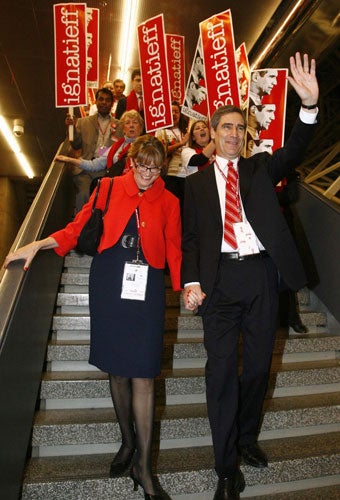Ignatieff: From prime time to Canadian prime minister?
Presenter who helped send Britons to bed wakes up as the next hope for Canadian Liberals. By Leonard Doyle

Your support helps us to tell the story
From reproductive rights to climate change to Big Tech, The Independent is on the ground when the story is developing. Whether it's investigating the financials of Elon Musk's pro-Trump PAC or producing our latest documentary, 'The A Word', which shines a light on the American women fighting for reproductive rights, we know how important it is to parse out the facts from the messaging.
At such a critical moment in US history, we need reporters on the ground. Your donation allows us to keep sending journalists to speak to both sides of the story.
The Independent is trusted by Americans across the entire political spectrum. And unlike many other quality news outlets, we choose not to lock Americans out of our reporting and analysis with paywalls. We believe quality journalism should be available to everyone, paid for by those who can afford it.
Your support makes all the difference.Familiar to viewers of late night BBC television, where for years he was a blowhard intellectual and presenter of earnest human rights documentaries, Michael Ignatieff was recently talking to Canadians about puffins.
Out in the frozen expanses of Newfoundland and Labrador he opined that the colourful birds would be a great symbol for the Canadian Liberal party and reeled off some attributes noting, "they hide their excrement".
Yesterday, after months of dirty work and secretive plotting, the gadfly journalist stood on the cusp of becoming Canada's next Prime Minister after taking over as head of the Liberal party. He immediately threatened to topple Prime Minister Stephen Harper's government. "I'm prepared to vote no-confidence in this government if the government does not present a budget in the national interest," said the man who has lived outside the country for most of the past 39 years.
As the Liberal standard bearer Mr Ignatieff is de facto leader of a loose coalition of opposition parties which attempted to stage a parliamentary coup against Mr Harper last week. The attempt to topple Mr Harper ended in pandemonium causing outgoing Liberal leader Stephane Dion to quit. The crisis was triggered by conservative plans to end subsidies the government pays political parties. The Liberals, New Democrats and the Bloc Quebecois depend on the funds far more than the Conservatives, and the threat of withdrawal saw them quickly unite against Mr Harper.
Mr Ignatieff must now decide whether to proceed with a no confidence vote when the next budget is tabled on 27 January.
It would be fair to say that millions of Canadians are scratching their heads at the sudden turn of events. As far as most are concerned the earnest centre-right politician who has landed in their midst is a blank slate. For the millions of Canadians, who like to define themselves as the polar opposite of Americans, the prospect of Mr Ignatieff becoming prime minister is unsettling. The fact he has spent most of his life abroad is just one aspect.
More problematic is that he has little political experience and his views on major issues are often at odds with consensus opinion in Canada.
Many disagree strongly with his views on issues like the Iraq war, which he supported. Back in 2002, in the magazine Granta, Mr Ignatieff wrote of his admiration for the US, even though he protested against the war in Vietnam as a youth. "I loved my own country, but I believed in America in a way that Canada never allowed."
Yesterday, the 61-year old former BBC political commentator and author of books translated into 19 languages was uncharacteristically coy about his coalition plans. His usually busy blog, michaelignatieff.ca provided few clues. Political analysts expect him to move the party to the right rather than force an immediate change of government.
It is just three months since Mr Harper's Conservatives won national elections but failed to secure a majority in the 308 members Parliament. He depends on the opposition to pass legislation and is vulnerable to sudden votes of no confidence.
Join our commenting forum
Join thought-provoking conversations, follow other Independent readers and see their replies
Comments